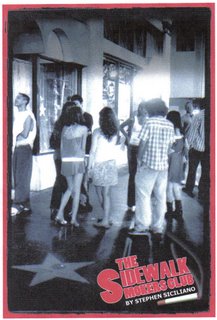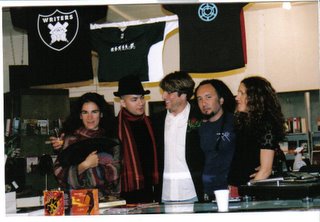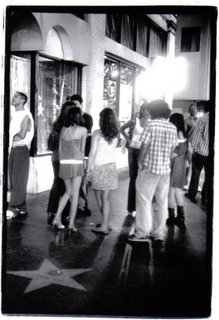 Chapter Fifty-seven
Chapter Fifty-seven Corey, who had either lost or given up his woman – depending on when he was considering the matter – and had made no real progress towards securing Yvonne’s deeper sentiments, found himself in a position most men bereft of female companionship do – arguing with a male friend.
In this case it was Randall.
There is something lilting about the effect of a woman on a man’s little world. When she is in his presence and the lovejuice is flowing both ways, he is a boy, needing satisfaction, coaxing and playing with his mate. When the emotional riverbed runs dry and the parties go their separate ways, he becomes, well, old and the two of them together – Randall and Corey – without the benefit of affection from the brighter lights in their coalition, were behaving like two septuagenarians holed up in the same apartment.
They had been reviewing an alarmingly thick pile of papers which held the thoughts of Randall and of his fellow Club members that were to be codified as a bum philosophy for all ages, cultures, and times. It has been observed that bum philosophy’s charm and virtue was that it aspired to so little, and so the prior statement may seem contradictory. But it was not, for it aspired to so little across all ages, cultures, and times.
They’d discussed the size of it. They’d admitted there was no form to speak of. The thing was growing out of control and was characterized by a single word uttered by Corey to Randall’s annoyance – “amorphous.”
Randall said, “Man, either these bums need to know a lot, or they have a lot to learn, but I guess we can trim a little here and there.”
Meanwhile, Corey found those nine commandments of laziness the pair had worked on earlier in The Sidewalk Smokers Club’s formation. “This stuff is great,” Corey smiled over their most ingratiating collaboration. Suddenly, the smile became something else. “Wait a minute,” he held a finger up and leapt a page or two forward, a page or two back (Randall wrote big). “There are only eight.” He read it a little more deeply. “There are only eight. One of mine is missing. The one that says ‘We are born tired and live to rest’.” He looked up at Randall.
“Well, man, like you said, it’s amorphous. We gotta cut. So I got rid of one to make it leaner,” and he grabbed a stack of misplaced papers next to his hand for illustration.
“Bullshit. Why would you cut before we talked about it needing to be cut? You were against it. We debated and you gave in…or so I thought.”
“Yeah I did,” Randall admitted, “but then I un-gave in,” which was not a way of putting it that was going to stay Corey’s rising ire. Randall, he thought, despite his up-close and personal look at mortality, was letting all this Sidewalk Smokers stuff get to the old head. And it was getting swollen.
And the truth was Randall did, like many people, believe destiny had marked him for something special. And there’s nothing like a little bright light and black ink on cheap pulp to feed one’s delusions. So that while throwing the last lazy bone at his partner he reminded himself that making the world a better place means treading over someone’s Elysian Fields of mediocrity now and again.
“But there’s only eight of them now. Eight. What a crappy number!”
“Numbers do not matter. Quantity is queer. You know a single sentence can make a career.”
“Wacky poets,” Corey grumbled, but could not repress a smile. “Give me an example.”
He knew Randall would have one ready and in asking for proof hoped to learn rather than pin his friend in mid-argument.
“Well, like, ‘I saw the best minds of my generation destroyed by madness, starving, hysterical naked'."
Corey was mighty pleased with the fact he recognized that line and knew it to be hardly a sentence at all, rather a mere fraction of the longest angry question ever posed.
And besides, it left unexplained why his commandment had been deleted. But he softened some more, recognizing Randall’s special genius for putting distance between unsavory circumstances and the fact he was responsible for them. He was also forced to admit his aversion to bearing the burden of final decisions while Randall was conveniently, and repeatedly, stepping into the breach for his good and that of everyone else involved.
But the best defense is a good offense so he backtracked and attacked the bum philsophy. “All you have here is a big messy un-systemic system.”
Randall did not know whether he should be flattered or insulted, so he waited for more.
“There are things of interest yes, and promise of better things to come, but there’s nothing here that makes you great…”
This was very true and had the affect of a cold water splash to Randall’s face. But what are friends for?
“…yet,” Corey added just a little too late.
Randall, who hadn’t been looking very well to begin with, took on a frightening pallor and it was a good thing that he himself couldn’t see it. “Yet…” Corey repeated to no visible affect on his partner’s diminishing confidence.
Randall waited a few moments, reached into a draw behind him, pulled out an unmarked cylinder of some tobacco brand or other.
“You’re right,” he said, eyes meeting Corey’s with a very flattering plea for an answer or two to the problem he’d just highlighted.
His friend and partner looked away. Randall thought that unless he were truly interested in taking the hits, he should have shut up.
If Corey had any answer, he probably wouldn’t have had the courage to express it.
Only some characters are groomed for going all the way. Others are meant to help and following this little moment of discord between them, the men fell back into their familiar roles, clearer on things.
Randall: “What did Clarisse say about the money?”
“She said ‘maybe’. I don’t think she was too crazy about the tobacco lobby stuff.”
“You told her?”
“I felt I had to give something up. And anyway, she’s right, it’s whoring.” Corey pointed out rather, well, pointedly.
“I know that already, man. That’s not what I need you for.” As usual Randall was looking for a little insight, not a statement of the depressingly obvious.
They gave the matter a spin or two between them and deduced that The Smokers had become a Catch-22, if such a thing is possible. The Good Guys in this multi-front war with the world they had launched, only clean money interested them, and that was in short supply. Only honest people would do for alliances and they were, for all practical intents and purposes, a federally listed endangered species.
Randall felt that in helping Yvonne, that in spinning the campaign that had become The Sidewalk Smokers Club’s reason for being, his motives were of the purest and loftiest kind, and it left him without air when press accounts and talk on the street presented them as otherwise.
He looked at what he was smoking, soured his face in distaste, and put it out on the table surface, seemingly unable to concentrate on the ashtray just a half-dozen inches away. “He’s literally green around the gills,” Corey told himself suddenly gripped by an inspiration.
“Lemme get a cigarette,” he said.
“Glrborue man,” Randall tried to stop him.
Corey got up, walked around the table separating them, pulled on the drawer, and chose from a wide variety of loose sticks in differing lengths and scents. He pulled out the fattest he could find. Randall turned away. His look was growing ghastly. His partner lit that hot dog and blew the first suck back out at Randall’s turned head.
“What kind is this?” Corey reached around and waved it under his nose.
Randall dropped to his knees and soaked the dry, lacquer-free hardwood floor with whatever unfortunate brew his gut had been manufacturing to that point.
Corey reached for the telephone and mentally drafted the statement on Randall’s collapsed condition for a press corps he knew was ready to report it. The moment was at hand. The comeback was within reach. And it hadn’t taken that long after all.
It was all proof of the necessity to talk stuff out for, just like that, things were looking up.
Chapter Fifty-eight Jordan was smoking his favorite concoction of tobacco and marijuana mixed, closed-off at the end by a little cardboard filter, when there was a knock on the door at a most importune hour. It scared him. He’d come home after having sat in a diner and seen the brazen posting of the suited man right out front of the establishment. Up to this point J. had bucked himself up pretty well with wise-guy remarks and private-eye bravado, but the combination of Randall’s allusion to the quiet life before celebrity and the unrelenting legal pressure had undermined his strategy, his confidence, his will to carry on. He did not have to open the door to know who was behind it; merely complete a reflex he’d practiced his entire life. Knocked doors were to be answered and this he did.
The man in the suit-and-tie, as Jordan had feared, was there. Up close, his eyes were friendly, his smile kind and this confused J. until, suddenly, Carlos’ head entered the doorframe, too. Whose smile was larger Jordan could not tell, but he felt compelled to use obscenity because he was surprised and because he was addressing Carlos. “What the fuck!”
“Ja, wa da fuck!” Carlos laughed.
“What are you doing here with this cop?”
Carlos first asked if they might come in and Jordan, sensing the danger recede, agreed. The Mexican then went on to explain how the guy in the suit was an employee of his and that he’d been tailing Jordan at his behest.
“What do ya mean he works for you?”
“He’s in my gang. He works for me,” Carlos shrugged.
Jordan stepped back to consider the subject anew. “But this guy’s wearing a suit.
He’s not even Mexican.”
“Chure ee is,” Carlos replied, “just not what jou think a Mexicano look likes.”
Jordan told him that he was exactly right.
“Well, I toll jou I was an important cholo from Eenglewood and you dint belif me. I haf a professional outfit. You think we all wears plaid shirts and baseball hats backward?”
“Yeah.”
Carlos went on to say that it was just as well. That the respectability was a cover he wanted in the running of his operation (but with different words). He’d had the suited man keep an eye on Jordan to be sure he was safe and didn’t get picked up by Dumburton in an unexpected moment.
Jordan wanted to know exactly what the suited man would do should that happen.
“Shoot him,” Carlos answered.
“Dumburton?”
“Jeah.”
“Jeezus.”
“Jou wanna go to jail?”
“No.”
Carlos shrugged and said, “What jou are fucking priest? You kielt an ol laydy.”
Jordan was past the point where he found a lesson from his co-worker to be humiliating. Carlos pulled out a thick white envelope and tossed it on the table where they were sitting. “Oping,” he directed Jordan to open it.
This J. did and saw a thick stack of cash consisting exclusively of $100 bills in a quantity approximating that necessary to hire the good lawyer for The Smokers and a few personal baubles to boot.
“Where’d you get this?”
“Some is from my business, some is from Armenia Power gang and de rest is from Java Whirl.”
Jordan asked for a clarification on the latter two, wisely feigning disinterest in the first.
Carlos filled him in: “De Armenia part come from a leetle talk wit jou fren.”
“What fren?”
“De one jou heet jou in de face. We haf a talk wid heem and he gonna geef you dis money. You gonna drop de charges.”
“What do you mean ‘we’ had a talk with him?”
Carlos responded with that wide smuggler’s grin. “Me and cuerno de chivo.”
Jordan nodded. The concession made sense. Then he asked how much his tormenter coughed up in exchange for his continued life and liberty. Carlos told him. J. raised his eyebrows. “Das what I tought,” said Carlos matter-of-factly.
“What about the Java Whirl money?” asked J.
Carlos smiled. Jordan could get away with pushing this (now obviously) cold and efficient criminal.
Carlos felt as a father to Jordan. Such are the dynamics in a country which obligates it immigrants to hard work while treating the native-born to an adolescence that can stretch well into middle age. Carlos envied Jordan that adolescence and it was what he hoped to give his grandchildren, if not his own brood. He observed Jordan’s existence in developing a blueprint for future generations of Zacatecan-Americans.
When J. went to bat for him against management at Java Whirl Carlos was touched and took helping Jordan, for real, under consideration.
“Ee’s from Java Whirl.”
“What do you mean it’s from Java Whirl?”
“It’s the money I stole. I giv to jou.”
“What? How?”
“I felt bad.”
“You let me go on like that and get fired when you knew you had stolen it?”
“I tol jou I felt bad,” Carlos said without any emotion whatsoever.
Jordan had a funny feeling he was but the first stop in an evening-long tour that would take Carlos through similar situations during which he dispensed either joy or fear depending on where his unique brand of wisdom led.
“Jeezus Carlos. I can’t believe you’d do that!”
“Wha? Jou wan me to get arrested? Stop crying. Da wassa a fabor and jou know eet.
Jou are more hip dan de people who comes in dat place. Why jou wanna work dare?”
Jordan marveled at the knowledge a life on the streets waving a cuerno de chivo around could produce.
And who is to say where it would stop? Was Ghengis Khan a groomed and broad-gauge man, practiced in policy administration, lettered, trained in the killing arts? Many a supposedly respectable empire had been founded on blood money and this was not a time for moral posturing. Sometimes you need these guys.
As the Angel Without Mercy, Jordan could claim no mantle to purity, which Carlos had already pointed out. In the meantime, he and The Sidewalk Smokers Club were in a fix. And here, another observation should be appended: Carlos loved The Sidewalk Smokers Club. It was a topic he never broached with Jordan, had never even let on he knew anything about, but followed through the press clippings and television reports with passion.
Carlos had been stunned by the swift, hard and unforgiving justice with which his new nation supported a rather suffocating regime of rules, fees, tickets, and prohibitions.
Jordan and his pals were engaged in a kind of tricky dirty work on behalf of his and all peoples’ freedoms and Carlos could not help but admire them. Important a cholo in Inglewood as he was, there were a lot of things he had to bow his head and beg for whilst smothering his sense of injustice and, quite frankly, The Smokers were giving outlet to those frustrations. Sure they were white kids. Sure they were college-educated and inhabiting a world of (relative) privilege unknown to Carlos. But, he thought, they were on the right side of the fence, and they were courageous, because they could not, in the end, win, but in the meantime were giving a few pimps the dry fuck they were so accustomed to giving everybody else.
He loved this and would help to the limited extent he could.
“I wan jou to take dis money and tell me if you need anymore,” said Carlos, making a fist with his hand, touching Jordan’s heart with it and then his own.
J. assented with a nod. It sure was a funny world where a guy like Jordan, who possessed neither a fetish for violence, death, nor devious ways where the acquisition of money was concerned, should be the benefactor of such a gift.
Very funny indeed.















